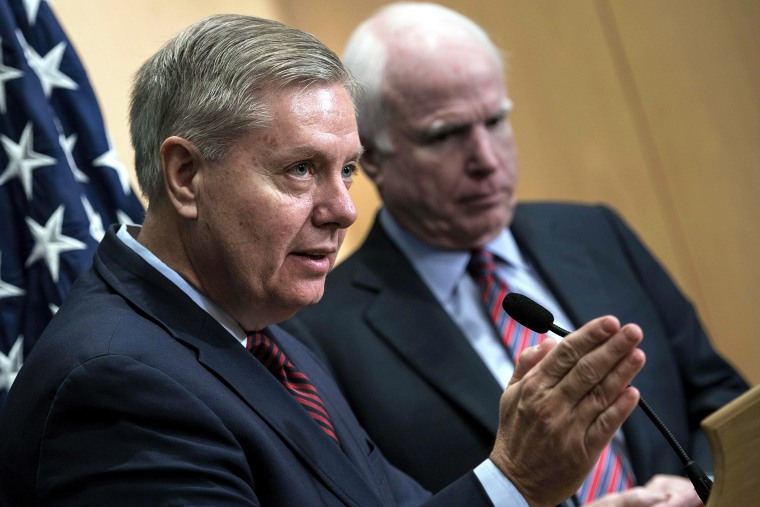For the most part, President Obama's strategy in Iraq, complaints from the right notwithstanding, is proceeding as the White House had hoped. The administration delayed airstrikes on ISIS targets until there was a change in Iraqi political leadership and there were Iraqi forces on the ground prepared to engage.
The policy may not have congressional approval, but it is going the way the president and his national security team had hoped. Maliki is headed out; Iraqi forces are functioning; and as
events in Amerli help demonstrate, ISIS's grip on key locations can be broken.
But that's not what most of the political world is focused on. Rather, it's a "gaffe" that has tongues wagging.
Obama said late last week that when it comes to confronting ISIS targets in Syria, the White House is still working with possible coalition partners and consulting with military leaders on possible strategies. "We don't have a strategy yet" for the next phase of the mission, the president
said, but the process is still unfolding.
Reporters and Republicans still seem to find this
outrageous. New Jersey Gov. Chris Christie (R) said the president's comments were "
scary." (When asked what he'd do differently, Christie said he
didn't want to talk about it.) Sen. Ted Cruz (R-Texas) also pretended to be outraged over the weekend,
saying of ISIS, "We ought to bomb them back to the stone age." Texas Gov. Rick Perry (R) and Sen. Rand Paul (R-Ky.)
joined the pile on, though for different reasons.
But it was Sens. John McCain (R-Ariz.) and Lindsey Graham (R-S.C.), both of whom still inexplicably claim to have credibility on matters of national security, who wrote a
New York Times op-ed urging the White House to adopt the hawks' foreign policy.
After more than three years, almost 200,000 dead in Syria, the near collapse of Iraq, and the rise of the world's most sinister terrorist army -- the Islamic State in Iraq and Syria, which has conquered vast swaths of both countries -- President Obama's admission this week that "we don't have a strategy yet" to deal with this threat is startling. It is also dangerous.
Actually, as recent history makes clear, what's far more dangerous is taking foreign policy advice from John McCain and Lindsey Graham.
It's a wonderful illustration of the emptiness of much Beltway foreign-policy-speak. McCain and Graham want Obama to act both "deliberately" and "urgently" because they're both happy words. (As opposed to "lethargically" and "rashly," which are nastier synonyms for the same thing.) But when you translate these uplifting abstractions into plain English, you see how contradictory McCain and Graham's demands actually are. You can either demand that Obama not bomb Syria until he's ensured he has a plan likely to win international and congressional support, or you can demand that he bomb as soon as possible. You can't demand both. One reason Obama isn't bombing in Syria yet is that he's not clear on what the goal would be. McCain and Graham are. "ISIS," they write, "cannot be contained." Why not? Hasn't the U.S. been containing al-Qaeda -- ISIS's estranged older brother -- for more than a decade now? But the two senators don't pause to explain. "It must be confronted," they declare. What does that mean? If the U.S. is bombing ISIS in Iraq, aren't we confronting the group already?
McCain and Graham also specifically call on Obama to pursue the very policy in Iraq that Obama has already implemented. Instead of praising the president's approach that they agree with, the Republican senators pretended not to know what the White House's policy is.
For more along these lines, Michael Cohen had
a great piece over the weekend, exploring how the "constant chorus of 'do something'" from Obama's critics is misguided, while Fred Kaplan makes a
compelling case that airstrikes in Syria probably wouldn't have the desired effect.
